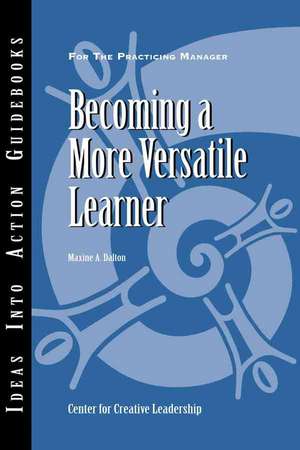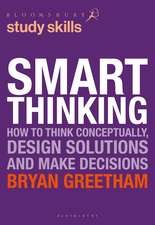Becoming a More Versatile Learner: Ideas Into Action Guidebooks
Autor Maxine A. Daltonen Limba Engleză Paperback – 10 iul 2012
| Toate formatele și edițiile | Preț | Express |
|---|---|---|
| Paperback (2) | 96.65 lei 43-57 zile | |
| Pfeiffer & Company – 10 iul 2012 | 96.65 lei 43-57 zile | |
| Center for Creative Leadership – 30 apr 1998 | 99.44 lei 38-44 zile |
Preț: 96.65 lei
Nou
Puncte Express: 145
Preț estimativ în valută:
18.49€ • 19.36$ • 15.30£
18.49€ • 19.36$ • 15.30£
Carte tipărită la comandă
Livrare economică 07-21 aprilie
Preluare comenzi: 021 569.72.76
Specificații
ISBN-13: 9781882197385
ISBN-10: 1882197380
Pagini: 26
Dimensiuni: 147 x 221 x 5 mm
Greutate: 0.06 kg
Editura: Pfeiffer & Company
Seria Ideas Into Action Guidebooks
Locul publicării:Hoboken, United States
ISBN-10: 1882197380
Pagini: 26
Dimensiuni: 147 x 221 x 5 mm
Greutate: 0.06 kg
Editura: Pfeiffer & Company
Seria Ideas Into Action Guidebooks
Locul publicării:Hoboken, United States
Cuprins
7 Introduction8 The Four Sets of Learning Tactics
Feeling Tactics
Action Tactics
Thinking Tactics
Accessing–others Tactics
13 Finding the Baseline
What Are Your Preferred Learning Tactics?
Benefits and Problems with Your Preferred Tactics
19 Becoming a More Versatile Learner
Get Out of Your Comfort Zone
Expand Your Learning Tactics
23 Conclusion: Setting a Learning Strategy
24 Suggested Readings
24 Background
26 Key Point Summary
Feeling Tactics
Action Tactics
Thinking Tactics
Accessing–others Tactics
13 Finding the Baseline
What Are Your Preferred Learning Tactics?
Benefits and Problems with Your Preferred Tactics
19 Becoming a More Versatile Learner
Get Out of Your Comfort Zone
Expand Your Learning Tactics
23 Conclusion: Setting a Learning Strategy
24 Suggested Readings
24 Background
26 Key Point Summary
Notă biografică
This series of guidebooks draws on the practical knowledge that the Center for Creative Leadership (CCL) has generated, since its inception in 1970, through its research and educational activity conducted in partnership with hundreds of thousands of managers and executives. Much of this knowledge is shared–in a way that is distinct from the typical university department, professional association, or consultancy. CCL is not simply a collection of individual experts, although the individual credentials of its staff are impressive; rather it is a community, with its members holding certain principles in common and working together to understand and generate practical responses to today′s leadership and organizational challenges.
The purpose of the series is to provide managers with specific advice on how to complete a developmental task or solve a leadership challenge. In doing that, the series carries out CCL′s mission to advance the understanding, practice, and development of leadership for the benefit of society worldwide.Maxine A. Dalton is a research scientist at the Center for Creative Leadership and program manager of the Tools for Developing Successful Executives program. Her research interests include adult development and learning in domestic and international organizations. Dalton has published widely, including Best Practices: Five Rationales for Using 360–Degree Feedback in Organizations in Maximizing the Value of 360–Degree Feedback: A Process for Successful Individual and Organizational Development (Jossey–Bass, 1998). She holds a Ph.D. in industrial/organizational psychology from the University of South Florida.
The purpose of the series is to provide managers with specific advice on how to complete a developmental task or solve a leadership challenge. In doing that, the series carries out CCL′s mission to advance the understanding, practice, and development of leadership for the benefit of society worldwide.Maxine A. Dalton is a research scientist at the Center for Creative Leadership and program manager of the Tools for Developing Successful Executives program. Her research interests include adult development and learning in domestic and international organizations. Dalton has published widely, including Best Practices: Five Rationales for Using 360–Degree Feedback in Organizations in Maximizing the Value of 360–Degree Feedback: A Process for Successful Individual and Organizational Development (Jossey–Bass, 1998). She holds a Ph.D. in industrial/organizational psychology from the University of South Florida.
Descriere
Almost all managers regard job experiences and the lessons they provide essential for their development as leaders. But not all of those managers are successful at learning those lessons.




















